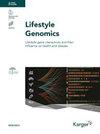The interaction between the dietary phytochemical index and CD36 rs1761667 polymorphism on the risk factors related to metabolic syndrome
IF 1.4
4区 医学
Q3 GENETICS & HEREDITY
引用次数: 0
Abstract
Introduction: The aim of the study was to assess the interaction between CD36 rs1761667 and dietary phytochemical index (DPI) on the risk factors related to MetS among apparently healthy adults. Methods: This cross-sectional study was conducted on 387 apparently healthy adults (20–70 years) of the recruitment phase of Yazd Health Study (YaHS). DPI was calculated using data from a validated, and reliable food frequency questionnaire. Genotyping of rs1761667 was performed by polymerase chain reaction-restriction fragment length polymorphism method. All participants were categorized into two categories, based on DPI scores. The interactions were tested using logistic regression in adjusted and unadjusted models. Results: There was no significant association between CD36 gene polymorphism rs1761667 and metabolic syndrome components as well as DPI score was not associated with the components of MetS. Significant interactions were observed between DPI and rs1761667 polymorphism on the odds of metabolic syndrome (P = 0.05) and odds of abdominal obesity (P = 0.01), so that, higher adherence to this index was associated with a low risk of MetS and abdominal obesity in individuals with AG genotype. In contrast, increased adherence to the DPI was associated with higher odds of abdominal obesity among the AA genotype. Conclusion: The AG genotype appears to be a protective factor against the risk of MetS and abdominal obesity with greater adherence to DPI. However, additional research is needed to elucidate these interactions and the mechanisms behind these associations.膳食植物化学物指数与 CD36 rs1761667 多态性对代谢综合征相关风险因素的交互作用
简介该研究旨在评估 CD36 rs1761667 和膳食植物化学物指数(DPI)对表面健康成年人 MetS 相关风险因素的相互作用。研究方法这项横断面研究的对象是亚兹德健康研究(YaHS)招募阶段的 387 名表面健康的成年人(20-70 岁)。使用经过验证的可靠食物频率问卷调查数据计算 DPI。通过聚合酶链式反应-限制性片段长度多态性方法对 rs1761667 进行基因分型。根据 DPI 评分将所有参与者分为两类。在调整和未调整模型中使用逻辑回归对交互作用进行了检验。结果显示CD36 基因多态性 rs1761667 与代谢综合征成分之间无明显关联,DPI 评分与代谢综合征成分也无关联。DPI 和 rs1761667 多态性对代谢综合征几率(P = 0.05)和腹部肥胖几率(P = 0.01)有明显的交互作用,因此,在 AG 基因型的个体中,较高的该指数坚持率与较低的代谢综合征和腹部肥胖风险相关。与此相反,AA 基因型的人对 DPI 的依从性越高,腹部肥胖的几率就越高。结论AG基因型似乎是一种保护性因素,可通过提高DPI的依从性来降低MetS和腹型肥胖的风险。然而,还需要更多的研究来阐明这些相互作用以及这些关联背后的机制。
本文章由计算机程序翻译,如有差异,请以英文原文为准。
求助全文
约1分钟内获得全文
求助全文
来源期刊

Lifestyle Genomics
Agricultural and Biological Sciences-Food Science
CiteScore
4.00
自引率
7.70%
发文量
11
审稿时长
28 weeks
期刊介绍:
Lifestyle Genomics aims to provide a forum for highlighting new advances in the broad area of lifestyle-gene interactions and their influence on health and disease. The journal welcomes novel contributions that investigate how genetics may influence a person’s response to lifestyle factors, such as diet and nutrition, natural health products, physical activity, and sleep, amongst others. Additionally, contributions examining how lifestyle factors influence the expression/abundance of genes, proteins and metabolites in cell and animal models as well as in humans are also of interest. The journal will publish high-quality original research papers, brief research communications, reviews outlining timely advances in the field, and brief research methods pertaining to lifestyle genomics. It will also include a unique section under the heading “Market Place” presenting articles of companies active in the area of lifestyle genomics. Research articles will undergo rigorous scientific as well as statistical/bioinformatic review to ensure excellence.
 求助内容:
求助内容: 应助结果提醒方式:
应助结果提醒方式:


